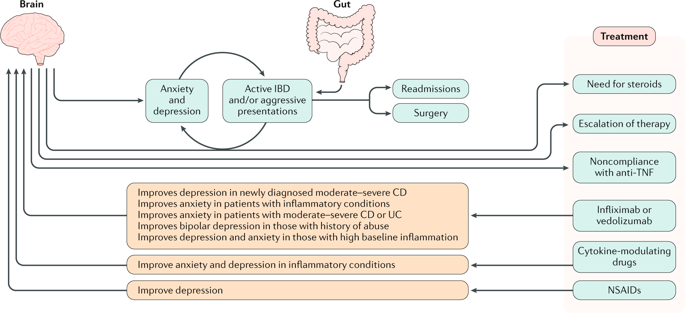当前位置:
X-MOL 学术
›
Nat. Rev. Gastroenterol. Hepatol.
›
论文详情
Our official English website, www.x-mol.net, welcomes your feedback! (Note: you will need to create a separate account there.)
Antidepressants in inflammatory bowel disease.
Nature Reviews Gastroenterology & Hepatology ( IF 65.1 ) Pub Date : 2020-02-18 , DOI: 10.1038/s41575-019-0259-y Antonina Mikocka-Walus 1 , Alexander C Ford 2, 3 , Douglas A Drossman 4, 5
Nature Reviews Gastroenterology & Hepatology ( IF 65.1 ) Pub Date : 2020-02-18 , DOI: 10.1038/s41575-019-0259-y Antonina Mikocka-Walus 1 , Alexander C Ford 2, 3 , Douglas A Drossman 4, 5
Affiliation

|
Gut-brain dysregulation has been recognized by the scientific community as being crucial to the understanding of chronic gastrointestinal conditions, and this has translated into the practice of a newly established discipline, psychogastroenterology. Along with psychotherapy, antidepressants (a subtype of central neuromodulators) have been proposed as treatments for gut-brain disorders that might benefit both psychological and gastrointestinal health. Antidepressants have been found to be effective for the treatment of comorbid anxiety and depression, pain and impaired sleep. Although the efficacy of antidepressants is well established in disorders of gut-brain interaction (DGBI), evidence is only now emerging in IBD. This Perspective discusses the use of antidepressants in DGBI and IBD, focusing on how what we have learnt about the role of antidepressants in DGBI could be applied to help optimize the management of IBD.
中文翻译:

抗炎药在炎症性肠病中。
肠脑功能失调已被科学界确认为对了解慢性胃肠道疾病的关键,这已转化为新建立的心理胃肠病学的实践。与心理疗法一起,抗抑郁药(中枢神经调节剂的一种亚型)已被提议作为可有益于心理和胃肠健康的肠脑疾病的治疗方法。已发现抗抑郁药可有效治疗合并症焦虑症和抑郁症,疼痛和睡眠障碍。尽管抗抑郁药的功效在肠脑相互作用(DGBI)疾病中已经确立,但IBD的证据才刚刚出现。本观点讨论了DGBI和IBD中抗抑郁药的使用,
更新日期:2020-02-18
中文翻译:

抗炎药在炎症性肠病中。
肠脑功能失调已被科学界确认为对了解慢性胃肠道疾病的关键,这已转化为新建立的心理胃肠病学的实践。与心理疗法一起,抗抑郁药(中枢神经调节剂的一种亚型)已被提议作为可有益于心理和胃肠健康的肠脑疾病的治疗方法。已发现抗抑郁药可有效治疗合并症焦虑症和抑郁症,疼痛和睡眠障碍。尽管抗抑郁药的功效在肠脑相互作用(DGBI)疾病中已经确立,但IBD的证据才刚刚出现。本观点讨论了DGBI和IBD中抗抑郁药的使用,



























 京公网安备 11010802027423号
京公网安备 11010802027423号